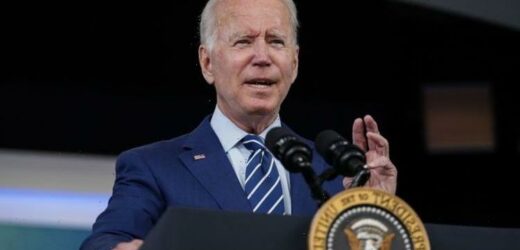Joe Biden on need to 'engage deeply' with rest of the world
We use your sign-up to provide content in ways you’ve consented to and to improve our understanding of you. This may include adverts from us and 3rd parties based on our understanding. You can unsubscribe at any time. More info
A team of officials will be dispatched to Colombia, Ecuador and Panama next week in what the White House has called their “Build Back Better for the World” scheme. It comes after talks in the G7 were held in Cornwall to develop a project intended to rival China’s initiative which gives Xi Jinping great political and diplomatic power. The Belt and Road initiative is a huge infrastructure investment project which allows trade and economic growth by building ports, roads, railways and internet highways across the world.
Up to 19 governments across Latin America and the Caribbean have also already signed up to China’s initiative.
Also coined the New Silk Road, it has been compared to China’s westward expansion between 206 BCE and 220 CE under the Han dynasty, which forged trade routes throughout central Asia.
But the US fear that China’s global influence could soar to superpower status after 100 countries signed up.
Now Mr Biden is looking to combat that.


US deputy national security adviser for international economics, Daleep Singh, is scheduled to meet Colombia’s President Duque, Ecuador’s President Lasso, and Panama’s public works minister, Rafael Sabonge, as well as business leaders and civic activists.
Mr Biden is also understood to have discussed infrastructure plans India’s Prime Minister, Narendra Modi, during bilateral talks at the White House.
India has refused to join China’s Belt and Road Initiative and border disputes between the two countries have soured their relationship.
White House officials say there are more than $40trillion (£29trillion) in potential infrastructure projects until 2035 across the developing world.
These include water treatment facilities in El Salvador, solar power plants in India, and pharmaceutical manufacturing in South Africa that could produce Covid treatments.

Washington has argued the US will ensure greater transparency, environmental care and working conditions.
It is not yet whether this project will overtake China’s initiative, which has been slammed for ignoring climate challenges and labour standards.
Beijing is currently South America’s biggest trading partner.
Brazil, the biggest economy on the continent, saw bilateral trade with China rise from $2billion (£1.48billion) in 2000 to $100billion (£74billion) in 2020.
DON’T MISS
Germany faces worse gas crisis as Britain outsmarts Putin [INSIGHT]
Brexit Britain win as Blackstone to create 2,700 UK jobs [REPORT]
Ukraine and Hungary summon ambassadors as fury erupts over Russian gas [REVEAL]


Some have warned that Washington may not fare too well in the battle for supremacy.
Oliver Stuenkel, a Brazilian professor of international relations at Sao Paulo’s Getulio Vargas Foundation, said: “The US needs to avoid making this a competition around infrastructure [in Latin America] where it is bound to lose.”
Source: Read Full Article


